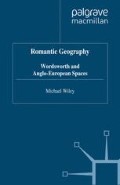Abstract
In the 1810s, Wordsworth increasingly attempts to accommodate British institutional interpretations and geographical representations of the world. At this time, spatial play between alternative worlds collapses as Wordsworth indicates that the world which he has imagined as a new, alternative world is to be found within the British institutional landscape. Certainly many of his old political resistances remained strong, foremost among them his opposition to tyranny that impinged upon liberty and economic self-sufficiency. But even as he promoted his older interests (along with new ones), his poetic landscapes make it clear that he did so from a shifting ideological position within an Anglo-European world where institutional ideologies also had changed dramatically. Whereas his earlier work often takes him literally off the map as he challenges institutional representations and uses of the land, he situates the work published in the 1810s — the final years of the Napoleonic wars and the first years of uneasy post-war peace — explicitly within a mapped landscape and within the ideologies implied by that landscape.
Utopia is a critique of dominant ideology insofar as it is a reconstruction of contemporary society by means of displacement and a projection of its structures into a fictional discourse. It is thus different from the philosophical discourse of ideology, which is the totalizing expression of reality as it is given, and of its ideal justification.
Louis Marin, Utopics: Spatial Play
Access this chapter
Tax calculation will be finalised at checkout
Purchases are for personal use only
Preview
Unable to display preview. Download preview PDF.
Notes
M.H. Abrams, The Mirror and the Lamp: Romantic Theory and the Critical Tradition ( London: Oxford University Press, 1953 ) p. 22.
G. Broeker, Rural Disorder and Police Reform in Ireland, 1812–36 ( Toronto: University of Toronto Press, 1970 ) p. 22.
W. Wordsworth, The Convention of Cintra, The Prose Works of William Wordsworth, vol. 1, eds W.J.B. Owen and J.W. Smyser ( Oxford: Clarendon, 1974 ) p. 323.
M. Glover, The Penninsular War: 1807–1814: A Concise Military History ( Hamden, CT: Archon Books, 1974 ) p. 86.
Copyright information
© 1998 Michael Wiley
About this chapter
Cite this chapter
Wiley, M. (1998). Abandoning Utopia. In: Romantic Geography. Romanticism in Perspective: Texts, Cultures, Histories. Palgrave Macmillan, London. https://doi.org/10.1057/9780230374263_6
Download citation
DOI: https://doi.org/10.1057/9780230374263_6
Publisher Name: Palgrave Macmillan, London
Print ISBN: 978-1-349-40405-6
Online ISBN: 978-0-230-37426-3
eBook Packages: Palgrave Literature & Performing Arts CollectionLiterature, Cultural and Media Studies (R0)

